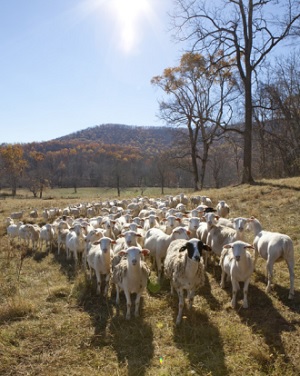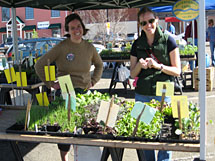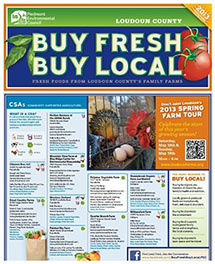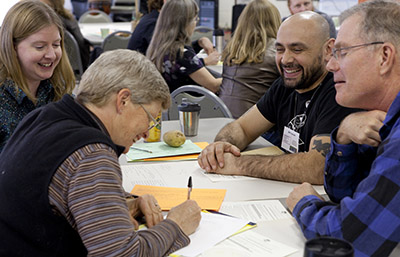'Know your farmer' is a popular phrase these days, but Derek and Amanda Luhowiak, owners of The Whole Ox Butcher Shop in The Plains, think people should get to know their butcher as well. Amanda, a native of Fauquier County, explains..
Working Farms & Food
Farmland and forests produce the necessities of life and provide essential natural services. In PEC’s nine county area, over 180,000 acres of farmland and 140,000 acres of forests are protected through private, voluntary land conservation.
Farmstead Ferments & New Moon Naturals
Sitting less than 100 yards from gardens and a variety of fruit trees on a farm in Charlottesville, I met with Dawn Story, founder of New Moon Naturals and Farmstead Ferments. Story tells me that she grew up in the Virginia Piedmont, and she was raised by a family who appreciated nature and a healthy diet.
Market Table Bistro
Opening a restaurant like Market Table Bistro was always a dream for Rebecca Dudley and Jason Lage, both of whom went to culinary school and later met while working at Lansdowne Resort. They each grew up in rural locations where farm to table wasn’t a trend as much as it was a way of life. Lage’s mother and grandmother cooked with primarily locally sourced and seasonal ingredients, and that’s a concept he has always wanted to bring to his own business.
Moutoux Orchard
It’s pick-up day at Moutoux Orchard and it looks nothing like the scene at your nearest grocery store. It is mid-March when I went to visit, there is snow on the ground and members of the Moutoux year round whole-diet CSA are picking up their fresh veggies, milk, eggs, meat and fresh flour for this week’s meals. A buzz of activity- as adults pick out their food and the kids weave in and out of the barn playing.

Renovating Worn-Out Pastures
Like many Piedmont farms, Over Jordan Farm in Rappahannock has been a pasture-based operation for decades. After 20 years of overgrazing, however, it’s facing issues that are common in the region—poor soil health, a lack of grass and plant diversity and the resulting lack of nutrients for livestock. This not only decreases a farm’s profitability, but it’s also a major source of runoff and soil erosion in VA.
Expanding Beef Cattle Profitability in VA’s Northern Piedmont
Currently:
• Most weaned and backgrounded calves leave the state for fattening in out-of-state feedlots.
• A small percentage of calves are kept as stockers before shipping to out-of-state feedlots.
• Most cow-calf operations take commodity price. Some buyers pay premiums.
• Beef returns as “boxed beef” for retail to metro-consumers. Value/revenue is lost out-of-state.
A small percentage (<10%) of the region’s farms and cattle are conception-to-carcass operations that direct market beef (mostly pasture raised or grass-fed) at a premium to consumers. They process beef (usually one or two at a time) at one of six custom facilities. These producers are seeking additional slaughter and processing capacity.
Pastures in the region are currently underutilized with gains at about 1 lb/day.
Efficiencies in cattle and pasture management, grazing, and transit, processing, even paperwork could increase returns to producers and the region. Processing and sales volumes could greatly increase. Additional acreage would be employed in grazing cattle retained in the region. Total returns to the regional economy would increase.
Loudoun Farm Incubator
The concept of incubators to launch new farm businesses has been developing in the sustainable agriculture community for years. Veteran agriculturalists understand that, much like a successful farm business, a successful farmer incubator requires very particular skills and experience.

Defining our Food Labels
When talking about our food, we constantly hear terms like ‘organic’, ‘local’, ‘free-range’, and ‘grass-fed.’ These labels are meant to guide consumers’ food purchasing decisions by offering information on the farming methods used to grow or raise food, and the reassurance that food safety risks have been minimized. More often than not, however, I find it difficult to distinguish the plethora of different labels.

Discovering Local Food
In my role as the Buy Fresh Buy Local Coordinator for The Piedmont Environmental Council (PEC), local food is an everyday topic of conversation. From broader discussions on how to encourage larger institutions to purchase locally or how to make the food distribution system more efficient, to quick conversations with farmers about a new ethnic vegetable variety or gourmet garlic — Buy Fresh Buy Local is all about strengthening our local food system so that it supports farmers and consumers alike.

Buy Fresh Buy Local Work Session
Piedmont Environmental Council has been a Buy Fresh Buy Local (BFBL) chapter coordinator since 2007. Over that time, our three BFBL chapters have grown to include over 600 farms, farmers’ markets, retailers, restaurants, wineries, and specialty food producers all committed to our local food system.
